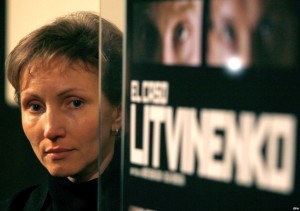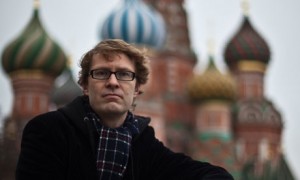Last week, the Guardian’s former Moscow correspondent Luke Harding reported on the near collapse of Britain’s long-awaited and long-bedeviled inquest into the murder of Alexander Litvinenko, the former FSB agent turned MI6 spy, who was brutally assassinated with a radioactive substance in London in 2006. The inquest has taken years to commence owing mainly to the UK government’s attempts to block it from loosing secret evidence that might further damage UK-Russian relations. Now, acting under pressure from Foreign Secretary William Hague, state coroner Sir Robert Owen has agreed to exclude evidence from the inquest which implicates the Russian government’s involvement in Litinenko’s murder, as well as evidence that might help determine if the British government could have done more to save its own spy’s life. This effectively means that whatever judgment emerges from the eventual hearing on October 2 will be “incomplete, misleading and unfair,” as Sir Robert himself put it.
Six years on, and with no real answers forthcoming about the murder of a British citizen on British soil, the Litvinenko affair continues to scandalize Britain and frustrate the deceased’s family and friends.
The Interpreter caught up with Luke Harding in London to ask him about the case and possible next steps.
The Interpreter: Marina Litvinenko has described the coroner’s decision to uphold Foreign Secretary William Hague’s application to withhold evidence allegedly demonstrating the involvement of the Russian government in her late husband’s death as an act of “sabotage.” What is your take on this?
Luke Harding: I think Marina is right. There is no other way of interpreting this kind of ruling other than as an act of sabotage by William Hague and David Cameron. It seems to me, and indeed to everyone, that the Russian state was involved, and yet six years on we have an inquest and we have the foreign secretary saying all the secret evidence the government has that supports this conclusion won’t be made public, against a background of increasingly friendly relations between Hague and Sergei Lavrov — and also Putin and Cameron ten days ago, with Cameron extolling Putin’s constructive stance on Syria.
All foreign relations are realpolitik and moralpolitik—the need to stay true to core values and also to deal with nasty states. But with the Tory party convulsed over Europe, this is quite appalling; and shamelessly the coalition has decided to do a deal with the Kremlin rather than see justice done for the Litvinenkos.
You don’t have to be mystic mog to know what would happen if the evidence all came out— a Russian state-sponsored assassination proven in court would have a negative response from Putin and harm UK-Russian trade interests.
What I’m intrigued by is: What did Putin offer? He thinks everyone has their price. This whole thing about intelligence cooperation: It was still tit-for-tat in 2007 because the Kremlin revused to extradite [suspected assassin, now Duma deputy Andrei] Lugovoy. It was a hysterical atmosphere. What [former Foreign Secretary David] Miliband did was to sever all intelligence cooperation with Russian intelligence. Because this was an FSB plot. No one knows how high up it was authorized, but it was undoubtedly FSB.
The key jigsaw piece is the fact that Cameron and Hague have resumed intelligence cooperation—quite an astonishing step. You might call it pragmatism. Or a sleazy lack of principle.
The Interpreter: Why is the UK government so desperate to bury this episode? Is it more than repairing the diplomatic relationship?
Luke Harding: It’s British domestic politics above all. Chances of Cameron’s being reelected are diminishing by the week. The only thing his government cares about is trade and investment, so this is really an existential question. Courting Russia, having a more accommodationist attitude, is seen as a way of reviving UK PLC. It’s a desperate gambit, one of the most shameful things that a British foreign secretary has ever done. Marina was denied legal aid from the state, and now this. Hague has punched a huge whole into the inquest.
The Interpreter: How will the reports in today’s Independent that a key witness is willing to give evidence at a public inquiry impact this case?
Luke Harding: I don’t know, I’m not sure it will change a huge deal—the more evidence the better, for sure. But this isn’t a criminal trial, its more of a truth-telling exercise. I don’t think it will change the dynamics of the case. What would is if we were shown the secret files, with a professional assessment as to where the polonium [the substance that killed Litvinenko] came from. I’m fairly sure the government would know where and who produced it: Pointing a big fat finger at the Kremlin, for political reasons.
The Interpreter: Will there be a public inquiry? If so, what will that mean for the parties involved?
Luke Harding: Well, I think Marina and her lawyer are calling for one. It’s become the least worst option, because the inquest has collapsed in all but name. Sir Robert has said that he would recommend it to [British Home Secretary] Theresa May. The advantage is that if the inquest were to go full time, the judge would give an unfair verdict. But with a public verdict, the judge would have access to the state evidence the public could not view, and that evidence would be reflected in the judge’s summing up. A public inquiry would be a fuller forum and could yield a better answer.
This is all deeply disappointing, especially for anyone who thought Hague was interested in ethics. The other thing is: we can also no longer look at the role of MI6 and its duty of care. We know that Litvinenko was on their payroll, getting regular payments into offshore bank accounts. Why did they not realize he was at risk? Is there some culpability there? There are legitimate questions to ask.

Marina Litvinenko, widow of Aleksandr Litvinenko, at the presentation of the documentary film “The Litvinenko Case” in Madrid in 2007. Source: RFE/RL
The Interpreter: Any forecasts on this case–both in terms of the individuals involved and the broader context of UK-Russian relations?
Luke Harding: A public inquiry will happen, there will be no closure. Marina has been waiting for 6 years to get a proper answer from the authorities as to what happened. She knows that Lugovoi and [Dmitry] Kovtun [the other principal suspect in Litvinenko’s murder] wont be brought to trial, but you want the truth to be out there, and Hague has made that impossible. Also, by closing down the inquest, the Kremlin is already saying that [recently deceased oligarch and UK resident Boris] Berezovsky killed Litvinenko. This is a disinformation campaign and Hague is playing right into it by hanging onto the evidence.
